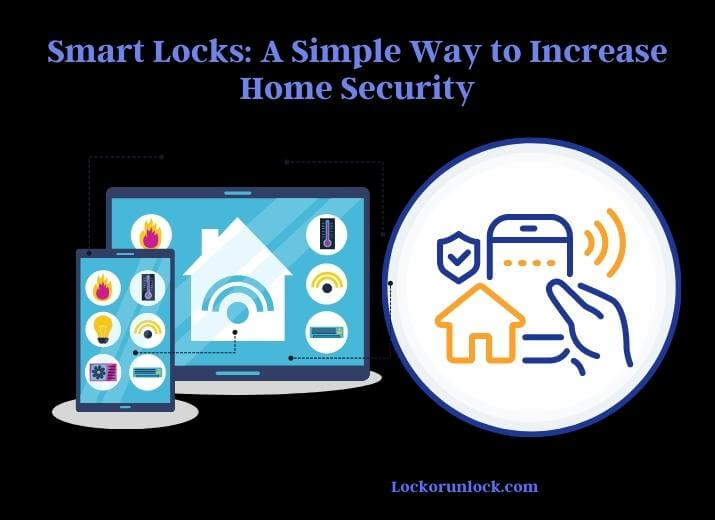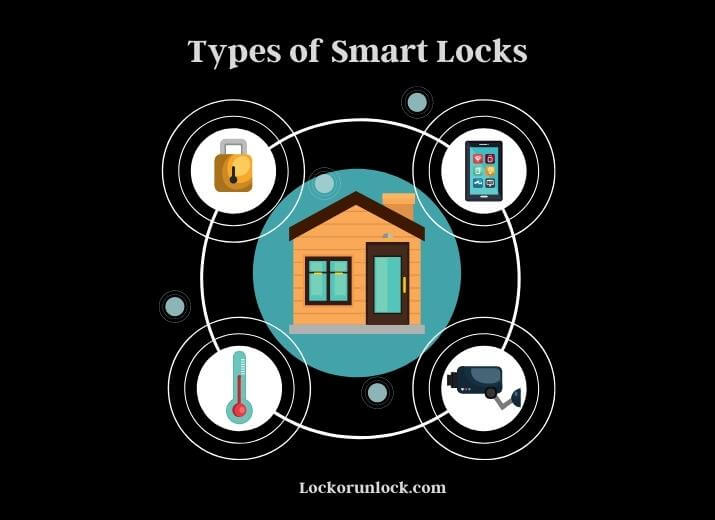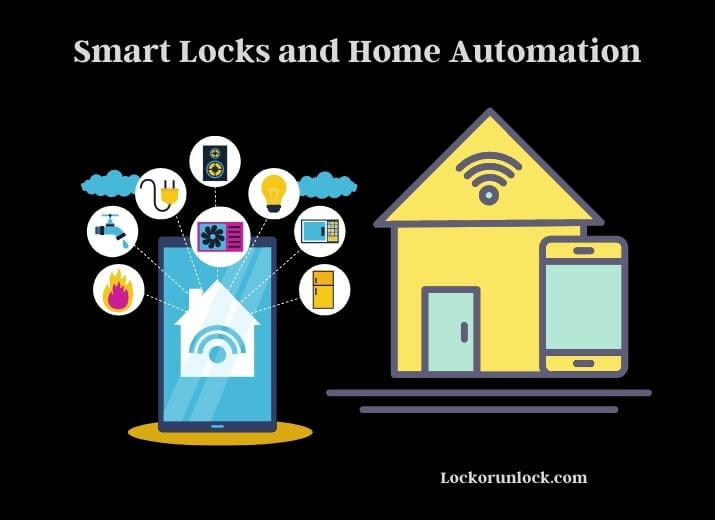The rise of smart home technology has transformed the way we interact with our homes, and one of the most significant innovations in this space is the smart lock. Smart locks offer a range of features that traditional locks simply can’t match, such as remote access, voice control, and keyless entry. They offer convenience, security, and peace of mind for homeowners.
With any new technology, there are also concerns about security and privacy.

Smart locks are a cutting-edge technology that is revolutionizing the security industry. By utilizing the latest advances in wireless communication, biometrics, and encryption, smart locks make it easier than ever to protect your home or business from intruders. With the added convenience of remote access, users can now open and close their doors from anywhere in the world, without the need for a physical key.
Smart locks also allow for a variety of customizable features, including programmable access codes, door monitoring, and motion detection. Smart locks provide unparalleled security and convenience and are quickly becoming the standard for home and business security.
Smart Locks
A smart lock is an electronic lock that uses wireless communication technology, such as Bluetooth or Wi-Fi, to interact with a mobile device or a smart home system. It can be operated remotely through a mobile app or a virtual assistant, such as Amazon Alexa or Google Assistant.
Smart locks can provide various features, including keyless entry, remote access control, activity monitoring, and automatic locking and unlocking based on predefined rules or geolocation. They are designed to enhance the convenience, security, and flexibility of locking and unlocking doors in residential and commercial buildings.
Types of Smart Locks
There are several types of smart locks available on the market, each with its own unique features and benefits. Locks can be used in different settings, and each setting requires a specific type of lock. Here are some of the most common types of smart locks.

Keypad Locks
Keypad locks are one of the most popular types of smart locks. They feature a numeric keypad that allows you to enter a code to unlock the door. Some keypad locks also have a backup key for added security.
Bluetooth Locks
Bluetooth locks use Bluetooth technology to connect to your smartphone or another mobile device. They typically work within a range of 30-50 feet and can be unlocked using an app on your phone.
Wi-Fi Locks
Wi-Fi locks connect to your home Wi-Fi network and can be controlled using an app on your smartphone. They offer more advanced features than Bluetooth locks, such as remote access and integration with other smart home devices.
Biometric Locks
Biometric locks use fingerprint recognition technology to unlock the door. They offer a high level of security and convenience, as you don’t need to remember a code or carry a key.
Hybrid Locks
Hybrid locks combine traditional keys with smart technology. They offer the convenience of remote access and other smart features, as well as the security of a traditional lock.
Features of Smart Locks
Smart locks offer a range of features that make them more versatile and convenient than traditional locks. Here are some of the most common features of smart locks.
Remote Access
One of the biggest advantages of smart locks is the ability to control them remotely. With a smartphone app or a voice assistant, you can lock or unlock your door from anywhere, at any time.
Keyless Entry
Smart locks eliminate the need for keys, which can be lost, stolen, or duplicated. Instead, you can use a code, a fingerprint, or your smartphone to unlock the door.
Voice Control
Many smart locks are compatible with voice assistants like Amazon Alexa and Google Assistant, allowing you to lock and unlock your door with voice commands.
Integration with Smart Home Devices
Smart locks can be integrated with other smart home devices, such as security cameras, doorbells, and thermostats. This allows you to control them all from a single app and create a more automated home security system.
Low Battery Alerts
Smart locks run on batteries, and it’s important to keep them charged to ensure that your lock is working properly. Some smart locks come with low battery alerts, which can help you avoid a lockout situation.
Activity Logs
Smart locks can track who is entering and leaving your home, providing you with an activity log that can be useful for security and monitoring purposes.
Installation and Maintenance
Installing and maintaining a smart lock is generally straightforward, but there are some important considerations to keep in mind.
Installation
Compatibility: Before purchasing a smart lock, it’s important to ensure that it’s compatible with your door and existing hardware.
Power Source: Smart locks typically run on batteries, so it’s important to ensure that you have a reliable power source nearby.
Installation Process: Most smart locks come with detailed installation instructions, and many are designed to be installed without professional help. However, if you’re not comfortable with DIY installations, you may want to consider hiring a professional.
Maintenance
Battery Life: The batteries in your smart lock will need to be replaced periodically, so it’s important to keep an eye on their remaining life. Most smart locks will alert you when the battery is running low.
Cleaning: Regular cleaning can help ensure that your smart lock is working properly. Use a soft, damp cloth to clean the lock and keypad, and avoid using harsh chemicals that could damage the electronics.
Firmware Updates: Smart locks may receive firmware updates periodically to fix bugs or improve security. Be sure to check for updates regularly and follow the manufacturer’s instructions for installing them.
Security and Privacy Concerns
While smart locks offer many advantages over traditional locks, they also come with some security and privacy concerns that should be taken into consideration.
Hacking
Like any other smart device, smart locks can be vulnerable to hacking. It’s important to choose a reputable brand with a proven track record of security to reduce the risk of unauthorized access.
Battery Life
If the battery of your smart lock dies, you may be locked out of your own home. It’s important to monitor battery life and replace batteries before they run out completely.
Malfunctions
Like any other electronic device, smart locks can malfunction. It’s important to have a backup plan in case the lock fails to unlock, such as keeping a spare key or having a locksmith on standby.
Privacy
Smart locks can collect data on who is entering and leaving your home, which can raise privacy concerns. It’s important to read the manufacturer’s privacy policy and understand how your data is being used and stored.
Power Outages
Smart locks rely on power to function, so if there’s a power outage, you may be locked out of your own home. Consider investing in a backup power source or keeping a spare key on hand.
Smart Locks and Home Automation
Smart locks can be integrated with other smart home devices, such as security cameras, doorbells, and thermostats. This allows you to control them all from a single app and create a more automated home security system. Here are some ways that smart locks can be integrated with home automation:

Security Cameras
Smart locks can be integrated with security cameras to provide a complete home security system. When someone enters your home, the security camera can capture footage and send an alert to your smartphone.
Doorbells
Smart locks can be integrated with doorbells to allow you to see who’s at your door and remotely unlock the door for trusted visitors. This is especially useful for deliveries or when you’re away from home.
Thermostats
Smart locks can be integrated with thermostats to automatically adjust the temperature when you enter or leave your home. This can help save energy and reduce your utility bills.
Voice Assistants
Many smart locks are compatible with voice assistants like Amazon Alexa and Google Assistant, allowing you to lock and unlock your door with voice commands.
Smart Lighting
Smart locks can be integrated with smart lighting systems to automatically turn on the lights when you enter your home. This can help improve security and make your home more welcoming.
Conclusion
Smart locks are a convenient and secure way to lock and unlock your home. They offer many benefits over traditional locks, such as remote access, keyless entry, and integration with home automation systems.
They also come with some security and privacy concerns that should be taken into consideration.
When choosing a smart lock, it’s important to consider compatibility, power source, and installation process. Maintaining your smart lock by monitoring battery life, cleaning it regularly, and installing firmware updates can help ensure that it functions properly. It’s also important to take steps to mitigate potential security and privacy concerns, such as choosing a reputable brand, having a backup plan, and understanding the manufacturer’s privacy policy.
Smart locks can be integrated with other smart home devices, such as security cameras, doorbells, thermostats, voice assistants, and smart lighting systems, to create a more automated and enhanced home security system.
